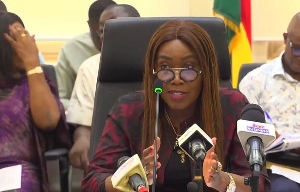Opinions of Thursday, 23 April 2009
Columnist: Blamboya, Lt
Resettlement: Don't Divide Northern Region
Over the past few weeks we have been pelted with the case for dividing the Northern Region. Here I have a few reasons why that idea should be binned, and instead go for the direct opposite, for maximum benefit to the state, individuals and for our unity.
The main case for the proposed division is the sparsely populated settlements, making it difficult for regional officials to properly serve all citizens. If you can’t reach people, bring them closer. Bring them together [amalgamation] to share amenities and free up land resource. This does not apply in the north only but the whole country where few people live in unserviceable or hard to reach settlements. An example is a village called Berekum (not B/A) in the Offinso district (A/R) where a lorry goes there only once in a week, Thursdays, the market day of the nearest bigger village, Abofour. The boys in the whole school (primary and JSS) were less than a football team.
HOW CAN THIS BE DONE? In the case of the north, these are people who are already fighting even when living apart: who is going to release land for whom? This is the interesting and controversial bit.
Ghana is a republic, and has been since 1960. When it comes to land ownership however we are a combination of small and diverse monarchies. This is the main cause of the conflict in the north, the seemingly unsolvable and hideous land tenure system, the numerous land ownership disputes, the chieftaincy disputes and to some extent the sense of disunity in the nation. As a republic the central government has the right to own any land it requires [eminent]; of course subject to AFFORDABLE compensation. The central government should use this right to own all lands. Armed with the control of the lands, small remote villages can be resettled near big towns with expandable social amenities: schools, hospitals, police stations, banks, post offices, telephone and internet services, courts, good transport links, etc.
The chiefs who agree to the scheme will be given titles with incentives such as some preferential treatment, which can be passed on to their successors. They may also be given some land to go with the title which must not be sold under any circumstances, but solely for their personal use subject to planning permission.
The new houses should not be expensive. Anything better than what the new settlers used to have will do fine; well planned mud houses with at least a decent indoor toilet to a house. The houses would have to be plastered with cement. There are some colonial houses built this way that are still standing in our cities.
ADVANTAGES
Massive land resource will be available for large scale commercial farming where aircrafts are utilised. The towns created near by should be the processing centres for the farm produce.
Law and order, and provision of justice will be available to all.
Chieftaincy disputes that usually emanates from lucrative land selling by some crooked chiefs will be literally eliminated.
The big towns will create market for small scale private enterprises and trades.
Cruel and uncivilised practices that flourish un-noticed in small remote dwellings will be checked.
Every child in the country will have access to what life is really like outside some of these isolated places.
In time, every citizen will call any part of Ghana as home, a real sense of unity.
This will also enable the state to properly plan towns and cities, with open spaces, parks for relaxation and good drainage systems.
This idea may look physically daunting but can be done. The biggest obstacle is a political will and a leader with a lion-heart. The party to attempt this will be committing a political suicide unless the benefits are realised within a term of office, or a successive party continues such programme till the benefits are felt.
By Lt. Blamboya, Kumasi.












